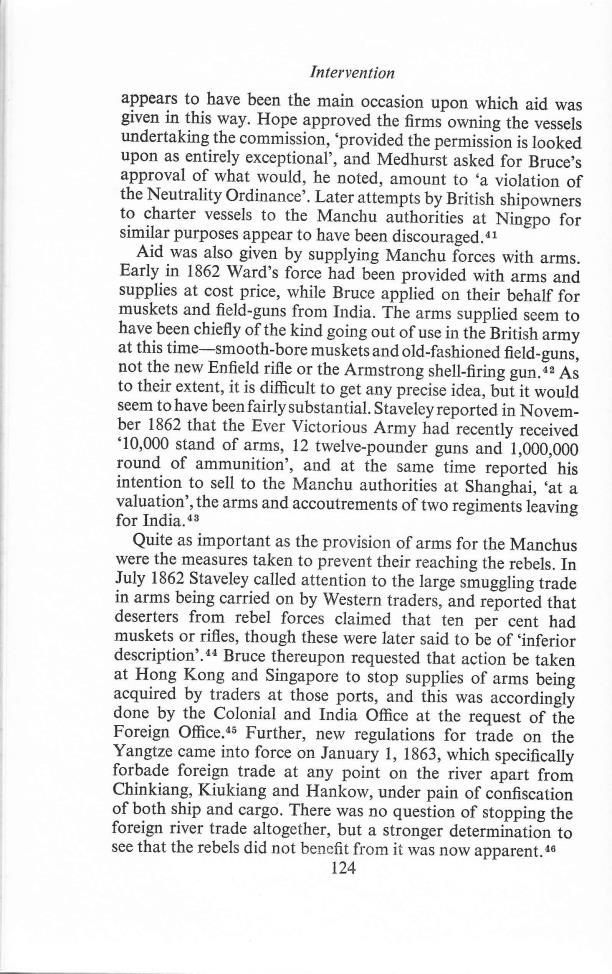正在加载图片...

Intervention appears to have been the main occasion upon which aid was given in this way.Hope approved the firms owning the vessels undertaking the commission,'provided the permission is looked upon as entirely exceptional',and Medhurst asked for Bruce's approval of what would,he noted,amount to 'a violation of the Neutrality Ordinance'.Later attempts by British shipowners to charter vessels to the Manchu authorities at Ningpo for similar purposes appear to have been discouraged.41 Aid was also given by supplying Manchu forces with arms. Early in 1862 Ward's force had been provided with arms and supplies at cost price,while Bruce applied on their behalf for muskets and field-guns from India.The arms supplied seem to have been chiefly of the kind going out of use in the British army at this time-smooth-bore muskets and old-fashioned field-guns, not the new Enfield rifle or the Armstrong shell-firing gun.42 As to their extent,it is difficult to get any precise idea,but it would seem to have been fairly substantial.Staveley reported in Novem- ber 1862 that the Ever Victorious Army had recently received '10,000 stand of arms,12 twelve-pounder guns and 1,000,000 round of ammunition',and at the same time reported his intention to sell to the Manchu authorities at Shanghai,'at a valuation',the arms and accoutrements of two regiments leaving for India.43 Quite as important as the provision of arms for the Manchus were the measures taken to prevent their reaching the rebels.In July 1862 Staveley called attention to the large smuggling trade in arms being carried on by Western traders,and reported that deserters from rebel forces claimed that ten per cent had muskets or rifles,though these were later said to be of 'inferior description'.44 Bruce thereupon requested that action be taken at Hong Kong and Singapore to stop supplies of arms being acquired by traders at those ports,and this was accordingly done by the Colonial and India Office at the request of the Foreign Office.45 Further,new regulations for trade on the Yangtze came into force on January 1,1863,which specifically forbade foreign trade at any point on the river apart from Chinkiang,Kiukiang and Hankow,under pain of confiscation of both ship and cargo.There was no question of stopping the foreign river trade altogether,but a stronger determination to see that the rebels did not benefit from it was now apparent.4 124r汔r纟 rve刀 r`° 卩饣 appears t。 have been伍 e main occasion upon Ⅵ冖歧ch aid was given h this way.IˉrOpe appr。 ved the firms。 wnhg the vesse1s undertakhg the comlnission,‘ provided the per1nission is1。 oked upon as entire1y exccp住 onal’ ,and bⅠedhurst asked for Bruce’s approval of what would,he noted,amount to‘ a violation of the NeutraIity ord血 ance’ ,Later attelllpts by Br攵 ish ship。wners to charter vesseIs to the Manchu authOrities at 小Ⅱngpo for si1nⅡar purposes appear to have been discouraged。 41 E拶 iF埚劣 锯 泻t艮 】 喘 案 eΥ揣 如 喘 星 毖 骷 suppⅡcs at cost price,、 ⅣhⅡe Bruce appⅡed on their behalf f。 r muskets and nc1d~guns fron△ India.The ar1ms suppⅡ cd seem to have been chie且 y oft⒒e khd going out ofusein the British army r饣雾 :;拷 耶 蓝 耕 鋈 鞯 糨 甜 躐 黜 谶 βt any procise idca,butit would seem tohave beenI1廴 irIysubstantial。 Staveleyreported in Novem~ ber1862that the Ever`qctoⅡ ous Army had recently received ‘10,000stand。 f arms, 12twelve-pounder guns and 1,ooo,ooo round of an11nuniti。 n’ , and at the same thne reported his intention to se11to thc`Ι anchu authorities at shanghai,‘ at a VaIuation’ ,the arms and accoutrcments oftwr。 reghnents leaving for India,乜 : Q0te asimpo⒒ ant as the pr。 访蚯on of arms for曲 e Ma11chus were the rneasures taken to prevent their reac11ing the rcbc1s,In Ju1y1862Staveley called attention to the1arge smugg1ing trade in arms bejlI11g carⅡ ed on by Western traders,and reported that deserters from rebel forces clahned that ten per cent had muskets or riⅡ es,though tllese were hter s缸 d to be of‘ infeⅡ or descⅡption’ ,辽 4Bruce thereupon requested that acuon be taken at Hong Kong and shgapore to stop suppⅡ es of arms being acquired by traders at thOse p:rI;珏 done by the Colo血iaI and Indj 争lF砦I∶罗::ql是 ::r:瑁莒 Foreign Of【ice。 45 ]Further, new regulations for trade on the Yangtze came into force on January1, I863,、 vhich speGiIlcaⅡ y forbade foreign trade at any point on the river apart from Chinkiang,Kiukiang and Hanko、 v,under pain of confiscation of bodh ship and carg0。 Thcre was no question of stopping the foreign Ⅱver trade aItogether,but a stronger deterⅡ 1inau。nt。 see that the rebe1s did not benc§ tf1· om it was now apparent。 46 124